FOR BETTER OR WORSE, IT’S A TELLTALE TITLE
Suzan-Lori Parks claimed that her play Fucking A, now playing at the Urban Theater Company, was inspired by Nathaniel Hawthorne’s novel The Scarlet Letter. The Hawthorne work centers on a strong-willed Puritan woman named Hester who is forced to wear a scarlet letter by her community as a brand that proclaims her adultery. Parks writes about a woman named Hester who also is forced to wear the letter A (worn on her shoulder) to proclaim her as an abortionist. Fucking A opened in 2000 and was preceded by the Parks drama In the Blood, which also featured a woman named Hester. Both plays bear only distant resemblances in narrative or theme to the Hawthorne novel.
Fucking A is a grim, violent play set in “A small town in a small country in the middle of nowhere.” The time is “A not too distant future.” Hester the abortionist is at the bottom of the social scale, a necessary evil tolerated by the town. Her dominant emotion is mother love for her son, a young man who was sent to prison as a boy for stealing food because he was hungry. The woman responsible for the son’s imprisonment is the wife of the tyrannical town mayor, a woman desperate to have a child but apparently barren. Hester hates the mayor’s wife and seeks revenge, which Hester gets at the end of the play, but at a huge personal cost.
That’s the general outline of the plot. There are a number of complementary characters, including Canary Mary, Hester’s friend and a prostitute in love with the mayor, who owns the sexual rights to the woman. There is a butcher who romances Hester, three sadistic “hunters,” the mayor and his wife, Hester’s son, and an escaped convict. From time to time women appear at Hester’s home, seeking her services.
Parks attempts to enliven the bleak atmosphere by occasional insertions of music, with characters singing to the accompaniment of an on-stage piano and saxophone mini band. The musical breaks try to give the play an edgy Brecht-Weill flavor but the songs aren’t particularly effective and the ensemble consists mostly of non-singers. Women characters lapse into a gibberish language called TALK when discussing intimate female matters, the translations flashed into a screen at the rear of the stage. Like the music, the TALK interludes are interesting without being relevant to the main narrative.
The first act is long and turgid as the bits and pieces of the plot are presented to the audience. The intensity picks up in the second act, climaxed by some look-away-from-the-stage moments of violence. At the final blackout, Hester has exacted her fearful revenge for the loss of her son to years of unjust imprisonment, but her triumph is hollow and she’s left, isolated, to continue her trade.
Kelly Owens, an African American actress, plays Hester. Parks, who is also black, apparently wrote the role for a black performer, though there is no racial element to the play. Owens does a fine job in the emotionally taxing role of Hester, the only fully developed character in the play. The most interesting supporting character is the butcher, who is marginal to the main plot except that he teaches Hester how to slit a throat efficiently, a skill she uses with gory results at the end of the evening. Madrid St. Angelo plays the butcher will a genial realism. Parks gives the character a long verbal cadenza in which he recites a litany of the crimes and misdemeanors the butcher’s troublesome daughter has committed in the eyes of the town law. The passage is worthy of the best of Gilbert and Sullivan and delivered with wonderful brio by St. Angelo.
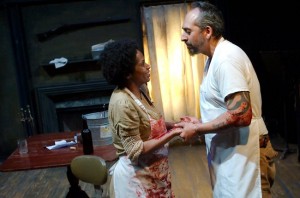
The remainder of the large ensemble is variable in effectiveness. There is good work from Lindsay Rose Kane as Canary Mary and Lance Newton as Hester’s “monster” son. Kamal Hans and Amrita Dhaliwal, both of whom are Asian, play the mayor and his wife. They may have been cast as the two best available performers for the show, but if they were cast to make an ethnic statement, its significance eluded me. The three vicious hunters are played with chilling credibility by Greg Wenz, Robert Hope, and Michael Moran. Jeffrey Levin plays some mean ragtime as the on-stage pianist. Courtney Berne completes the instrumental duo on saxophone.
The play is supposed to run two hours including a 10-minute intermission but it lasted almost two and a quarter hours on opening night. Director Richard Perez could eliminate that extra 15 minutes with advantage to give the production more pace. Production values are satisfactory, especially Freddie Rocha’s flavorful costumes and John Kelly’s dramatic lighting design. Jacob Watson is the set designer and Ross Hoppe is responsible for the video design.
Fucking A is a minor play by a major playwright. In spite of its Orwellian flavor, the play doesn’t make any importance social statement. Its narrative is disjointed and its dramatic impact relies mostly on shock (Hester is raped on stage and there is much blood-letting). The play may aspire to tragedy but it’s mired in gloominess to no particular purpose. The butcher’s marvelous cadenza and his song “A Meat Man Is a Good Man to Marry” provide the only bits of humor in the play, and are they ever welcome!
photos by Anthony Aicardi
Fucking A
Urban Theater Company at Pegasus Players
ends on April 15, 2012
for tickets, call 312-239-8783 or visit Urban Theater
for more shows, visit Theatre in Chicago
[Editor’s Note: Mr. Zeff notates in his original review that before discussing Ms. Parks’ play, the title must be dealt with. Since the playwright uses the participle form of one of the more pungent four-letter words in the English language as part of the title, some media outlets have used the full title and others have judiciously inserted asterisks to camouflage the word everyone will easily recognize. While Mr. Zeff votes for asterisks, Stage and Cinema believes that the title is meant to be provocative, indicating an “in-your-face” experience for the playgoer. Regardless of a playwright’s perceived lack of discretion, we will publish the title as is, sans asterisks.]
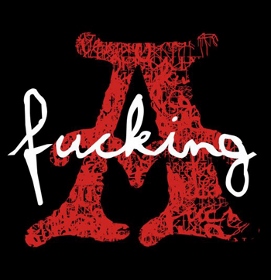
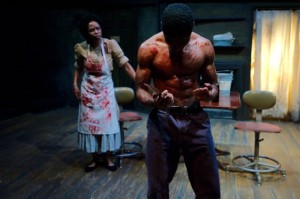
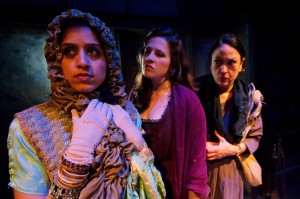
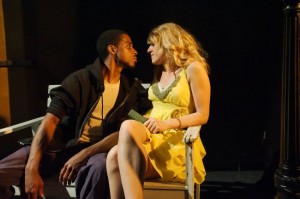
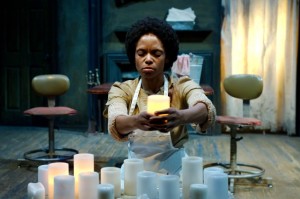
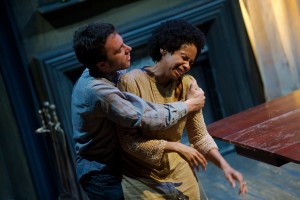

{ 2 comments… read them below or add one }
“though there is no racial element to the play”
Are you f*cking kidding me? If it were color blind casting maybe. But you have 3 white hunters/torturers and everyone in the prison is black. A black woman wrote the play, and though it could be put on as a less racially messaged play with a different cast selection — Obviously, the casting director for this production chose this cast for a reason. I saw the play a couple of nights ago and it was incredibly moving. So much so, I don’t think I could sit through it again. Kelly Owens was incredible at playing Hestor and you feel for her deeply. This play is not for the faint of heart. BTW – thanks for being a “Spoiler” and giving the end away for those that haven’t seen it yet. sheesh
The writer apparently was bringing his/her own perceptions to the play. There was nothing in the dialogue that referred to race and the black Hester’s best friend was a white prostitute and she was being wooed by the white butcher. The three vicious hunters were employed to run down victims, with no reference made to race. I don’t think I gave away anything that should have surprised the viewer. This was not a whodunnit with a surprise ending. But it’s nice to get a response from someone who really cared about the play.